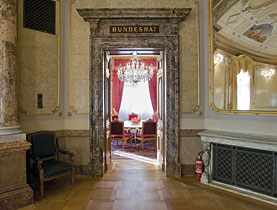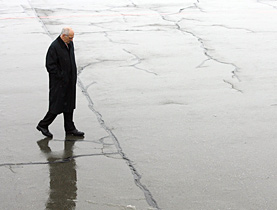Race is on as senior cabinet minister steps down

Transport Minister Moritz Leuenberger has announced his resignation for December after 15 years in Switzerland’s multi-party government.
The move is expected to give his centre-left Social Democratic Party new momentum ahead of next year’s general elections.
Leuenberger downplayed the timing of his announcement at a news conference on Friday and he dismissed media speculation about possible tactical moves or a feeling of personal frustration.
He said he had chosen this moment to leave others enough time to prepare for the election of next year’s president. Leuenberger has held the post, which rotates on an annual basis, twice before. He was due for a third term in 2011 according to a system of seniority.
“A third presidential year is not such an incredible political goal in itself,” he said.
Leuenberger said the remaining five-and-a-half months in office would allow him to bring to a symbolic end two major projects in his ministry. Major digging should be completed on the world’s longest rail tunnel through the Alps in October. He also wants to attend an international climate summit in Cancún scheduled for December.
He declined to sum up his career for the media at this stage and warned against reading too much into his decision.
Leuenberger, who is one of the longest-serving cabinet ministers in recent memory, has been facing calls for his resignation for a while.
However he defended his long career at the helm of ministry in charge of transport, environment, energy and communications issues, saying it helped establish a consistent policy.
Public transport and carbon dioxide
Leuenberger said he was privileged to see through in cabinet a proposal to introduce a carbon dioxide tax on fuel. The bill is now under discussion in parliament.
“Switzerland’s environmental policy enjoys an excellent reputation abroad,” Leuenberger added.
His party also praised him as a champion of public transport, notably moves to put heavy goods from the road onto rail.
This year’s Swiss President Doris Leuthard said she appreciates Leuenberger’s long experience and his good judgment.
“You can count on him. We have always had constructive and interesting discussions even if we did not always agree,” Leuthard told swissinfo.ch.
Leuenberger’s public reputation has been marked by his perception as a representative of urban Switzerland and as an intellectual. He was known for his witty speeches and his sometimes cutting irony. He was also seen as impatient and over sensitive in interviews with the media.
His critics have also accused him of being increasingly uninterested and showing a certain lethargy.
Race begins
Leuenberger said he would formally hand in his resignation to parliament during its autumn session. His successor is due to be elected on December 8, one year before general elections are scheduled.
His Social Democratic Party said it would call on its cantonal sections to present candidates by November.
Pascal Scarini, political scientist at Geneva University, says Leuenberger’s move will attract media attention over the months to come. It will give the party, which has been struggling in cantonal elections, an opportunity to regain ground ahead of next year’s general elections.
There is also speculation that other cabinet ministers could step down in the coming months, notably Finance Minister Hans-Rudolf Merz or even Foreign Minister Micheline Calmy-Rey.
Both have been under attack over the handling of the crises with Libya – over the temporary arrest of a son of Moammar Gaddafi in Geneva in 2008 – and with the United States over the bank UBS.
However, Sciarini believes Leuenberger’s resignation will strengthen their positions, he told the Swiss News Agency. Calmy-Rey is scheduled to take over the Swiss presidency in 2011, while Merz will probably stay on until next spring resigning ahead of the elections.
The rightwing Swiss People’s Party has staked a claim on Leuenberger’s seat in cabinet, saying it was under-represented even though it is the largest party in parliament.
The Social Democrats and the centre-right Radicals have two seats in the government, while the People’s Party, as well as the centre-right Christian Democrats and the Conservative Democratic Party hold one seat each.

More
Government, ministers, president
Leuenberger has been in charge of transport, environment, energy and communications issues since his election to the cabinet in September 1995.
He is one of the longest-serving ministers of recent years.
He entered local politics in Zurich in 1969 and served as member of the cantonal government in the 1990s.
He sat in the House of Representatives as a member of the centre-left Social Democrats from 1972 to 1991.
The trained lawyer, who will turn 64 in September, held the – largely ceremonial – post of Swiss President 2001 and 2006.
(With input form Andrea Clementi)

In compliance with the JTI standards
More: SWI swissinfo.ch certified by the Journalism Trust Initiative






You can find an overview of ongoing debates with our journalists here . Please join us!
If you want to start a conversation about a topic raised in this article or want to report factual errors, email us at english@swissinfo.ch.